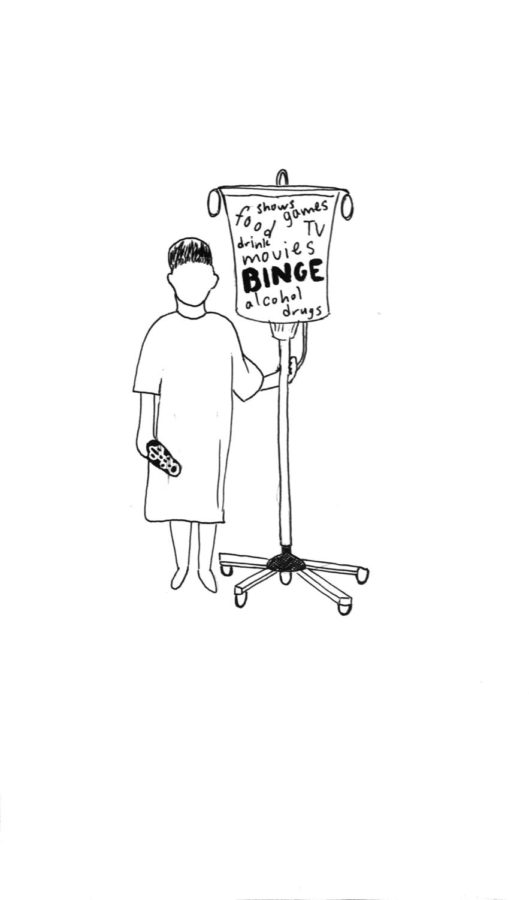Connotation of Binge is of Relapsing, not Relaxing
There are few words that evoke the desire to ignore all responsibilities and dive into a new season of a hit new series than the word “binge.” Over time, the excessive use of the word binge has undermined the word’s original intent, and clearer words that express light-hearted indulgence are more appropriate.
Originally referring to the continuous consumption of alcohol, food and drugs, the repeated usage of “binge” has evolved into a more casual connotation relating to binge-watching on streaming platforms and is associated with less severe forms of procrastination.
Binge-eating disorder (BED) involves recurring episodes of overeating and lacking a sense of self-control, according to the National Eating Disorders Association. BED-associated conditions such as anxiety, clinical depression, bipolar disorder and severe alcoholism can be life-threatening and, if not immediately addressed by a medical professional, can cause death, according to American Addiction Centers.
And yet, people have morphed this word associated with the hardship of not trusting one’s own body and mind into a word with a more relaxed connotation. Today, more people associate bingeing with watching entertainment such as Netflix series and movies. With summer vacation around the corner, bingeing the latest shows may be on everyone’s minds as a form of relaxation.
However, according to Guy Pearce who stars in the British supernatural television series “The Innocents,” Netflix disapproves of the term, signifying binge’s connotations are not entirely positive.
“When we did the promotion for [‘The Innocents’] in the [United States], we were strictly sort of instructed beforehand not to talk about ‘binge-watching,” Pearce said in an interview with Empire.
Because people associate severe issues such as BED and binge-drinking with binge-watching, the term removes previously serious mindsets about bingeing.
In May 2018, YouTube’s parent company Google released a new feature that discourages binge-watching, asking its viewers to “Take a Break” that users can customize to show every 15, 30, 60, 90 or 180 minutes, according to ABC News.
“However, this will not significantly affect consumption or engagement for the medium or the ads as it is mimicking a natural human mechanism,” CEO of IPG Mediabrands Indonesia Pradeep Harikrishnan said in an interview with Marketing.
It is unlikely people will stop “bingeing” their favorite shows. Bingeing has become an entertainment staple and a part of vernacular even though it has negative connotations. To properly represent the intended connotation of binge for less serious procrastination forms, the terms “indulge” and “luxuriate” are better matches.
Your donation will support the student journalists of Portola High School. Your contribution will allow us to purchase equipment and cover our annual website hosting costs.

Jane Zou is a staff writer and resident cartoonist for the Portola Pilot. As one of the few sophomores in the production, Jane is excited to contribute...




